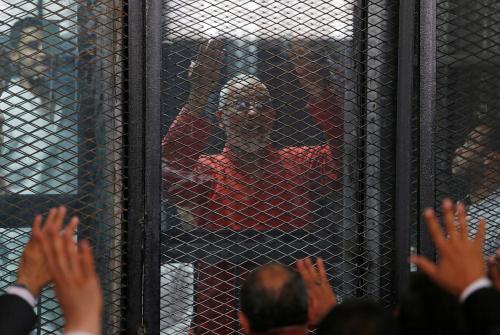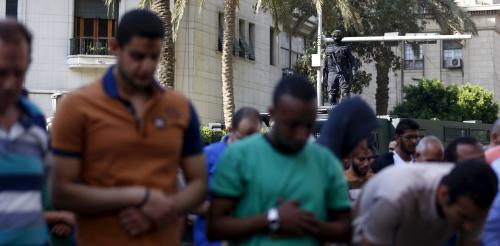We recently put a set of questions to 10 expert contributors participating in our Rethinking Political Islam initiative. (See here for the list of scholars.) Participants include leading scholars of Islamist movements, with each having conducted extensive fieldwork on Muslim Brotherhood and Brotherhood-inspired groups in 12 countries. The first question we posed to our experts was: How likely is it that the Muslim Brotherhood will abandon its official non-violent stance? The second was: How likely is it that an Islamist group will govern in each Arab country by 2020? The third was: How likely is a significant split within the Egyptian Muslim Brotherhood by 2020? Our latest post asked: By 2020, will more or fewer Islamist groups participate in elections in the Middle East?
Our fifth question—and the subject of this post—is: How much does scripture—in other words the Quran and hadith—influence the political behavior of Islamists? Participants were asked to answer on a scale from 0-100—a score of zero meant that scripture held no influence at all on behavior; 100 meant that scripture was the sole determinant of Islamist behavior. Overall, our experts arrived at an average of 25, meaning they believe scripture to be a significant factor, but one factor competing among others, and by no means predictive on its own of Islamist political behavior. (Note that this post is concerned with observable political behavior, rather than religious or educational activities of Islamist groups or their motivations.)
We gleaned a number of key takeaways from respondent comments.
Scripture matters, but interpretation of scripture matters even more. The experts polled were careful to distinguish between the words (nass) of the Quran and hadith and the variety of ways in which these words can, have been, interpreted in different times and places. “Scripture and hadith are (re)interpreted by individuals,” said one scholar, “who are themselves subject to a variety of pressures that I tend to see providing a lot of explanatory power. Surely, some amount of behavior is explained by scripture (or ideology). But to me, the most interesting research questions are when we see divergences [between religious ideology and political behavior].”
Similarly, another expert argued that “political behavior” could only be linked to scripture if one could show that “specific decisions and actions taken by Islamists in the realm of politics” match a “literal application of scriptural references.” One respondent said that had “the question been phrased as, ‘how much does interpretation of scripture influence Islamist behavior,’ I’d have [scored] it higher… interpretation and scripture as written are two different things—scripture lives through politics and context with some ‘red line’ exceptions.” One such “red line” for many Islamists is “gendered inheritance laws, which are very clearly spelled out in the Quran.”
For Islamists, scripture rarely gets in the way of politicking, and even more so in a time of state instability, uncertainty, and democratic closure across the Middle East. As one scholar put it: “My sense is that scripture is deployed contextually and pragmatically, with social, economic, and political objectives guiding interpretations of scripture more than the other way around.” Another expert, commenting on Brotherhood groups, noted that
Increasingly, we are seeing Brotherhood groups privilege political gains over ideological loyalty. Indeed, Brotherhood groups in Jordan and Kuwait have increasingly allied alongside secular political groupings that call for similar democratic reforms. During a period where democratic space is, generally speaking, shrinking throughout the region, it is increasingly likely that Brotherhood groups will prioritize demands for structural government reform over the implementation of traditionally Islamist social policies.
Another respondent echoed this, writing that
Quran and hadith are used by the Islamists to justify political choices that have nothing, or very, very little, to do with religion—not the other way around. Examples include the Syrian Muslim Brotherhood allying with Christian Marxist George Sabra in the Syrian National Council; Ennahda reconciling with the secular Nidaa Tounes party and supporting the “economic reconciliation law.” These examples cannot possibly be connected to a supposed influence of “religious scriptures” though they may have at times been sold and justified to the public as being a reflection of the Prophet Mohamed’s insistence that communities not be dragged into a pointless fitna (civil strife).
Similarly, commenting specifically on how Ennahda—commonly credited (or accused) of high levels of political pragmatism—one scholar said:
In Ennahda’s case, interpretations of the Quran and hadith helped justify a string of pragmatic positions. The frequent usage of post-hoc rationales to keep the base in line meant that scripture was not determinative—but rather more often justificatory—of political positioning… Nonetheless, it was highly relevant and influential, because many Ennahda members and leaders weigh questions of political maneuvering through the lexicon of scripture. Finding justification in scripture is therefore very important for Ennahda members; even if those justifications are themselves often context-dependent and subject to choices made by key leaders.
Scripture plays an underappreciated role for Islamists as a general frame and shaper of narrative. Zooming out a bit, one respondent wrote that “Islamist narrative framing and justification of political behaviors” is certainly informed by scripture. And while many (if not most) of our experts insisted on emphasizing the pragmatic nature of Islamist actors,
This does not mean that religion does not matter—it does play a role at the level of the base and even amongst leadership circles, especially when it comes to carrying out da’wa (proselytization), implementing projects to ‘Islamize’ society from below, creating the political conditions which will nurture the kind of stability in which campaigns for more ‘religiosity’ can be initiated.
In effect, scripture provides the resources and rhetoric with which Islamists construct their high-level worldview and distinguish themselves from other political competitors.
Another scholar elaborated on this point, noting that the religious movement (haraka) and the professional political party (hizb)—most Islamist groups contain both—deploy and engage scripture differently:
I think scripture shapes how Islamists view the aims of government—what the state should do, what the private sector should do, how much it should be regulated, and toward what ends. But I view Islamist parties, especially, as responsive to the kinds of institutional structures and broader culture frames they encounter (and seek to shape). If I take the question as extending beyond parties to broader Islamist movements [i.e. the haraka, it becomes a little harder to say. It seems possible that scripture plays a larger role for other Islamist organizations, in terms of attention to charitable practices, public morality, and personal piety.







Commentary
How much does scripture influence the political behavior of Islamists?
January 24, 2018